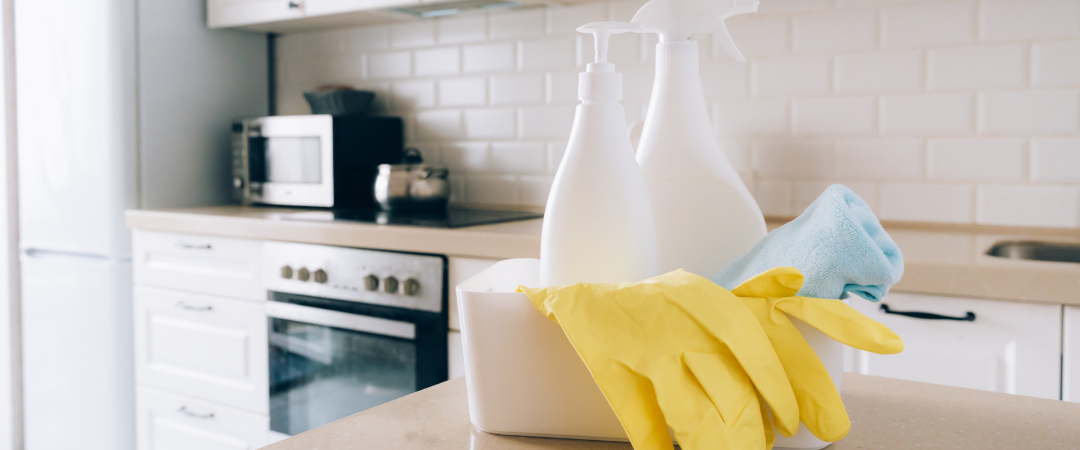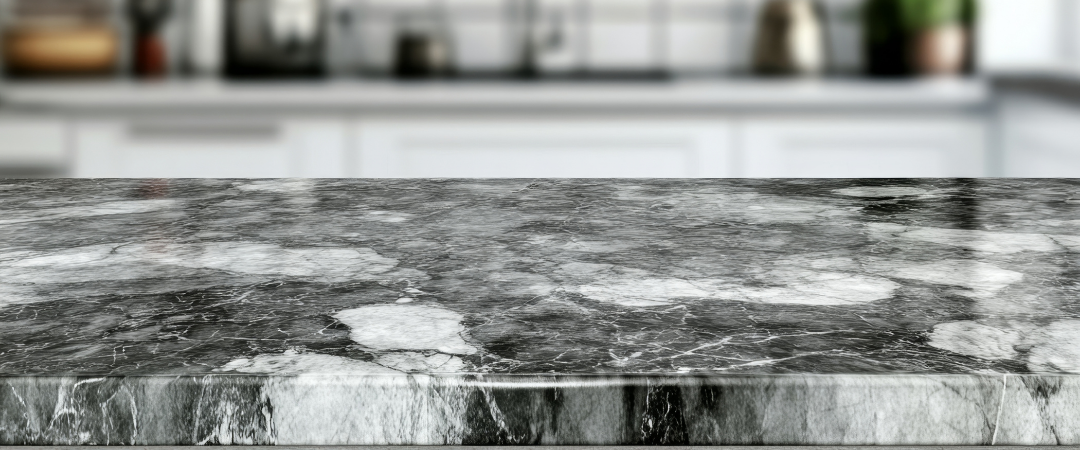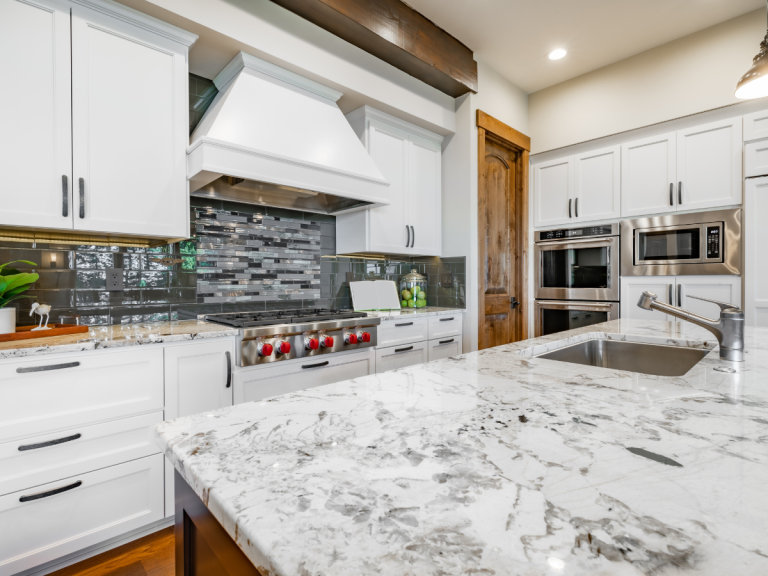Why Granite Countertop Maintenance Matters
Granite countertops are stunning—no doubt about it. But that beauty comes with a bit of responsibility. Taking care of your granite isn’t hard, but it’s important. If you’ve invested in granite, the last thing you want is dullness, cracks, or stubborn stains creeping in. Let’s dive into everything you need to know to keep your granite countertops looking showroom-fresh for years to come.
Understanding Your Granite Surface
‣ What Makes Granite Countertops Unique
Granite is a natural stone born from the heat and pressure of the Earth. It’s incredibly durable, heat-resistant, and distinct in appearance—no two slabs are the same. But its porous nature means it can absorb liquids, making maintenance essential.
‣ Common Misconceptions
Think granite is indestructible? Not quite. While it’s tough, granite can still stain, etch, or chip if neglected. Many homeowners believe sealing once is enough—truth is, sealing should be an ongoing habit.
Daily Granite Countertop Care
‣ Wipe Downs: Do’s and Don’ts
Daily maintenance starts with a simple wipe. Use a soft cloth or sponge with warm water. Avoid over-saturating. Skip those generic all-purpose cleaners—they can dull the surface or break down the sealant over time.
‣ Choosing the Right Cleaning Products
Avoid Harsh Chemicals : No bleach. No ammonia. And definitely no vinegar. These acidic and alkaline solutions can erode your granite’s sealant and cause long-term damage.
Go pH-Neutral : Look for cleaners labeled specifically for granite or stone surfaces. pH-neutral solutions are your best friend—they clean without breaking down the natural protection of the stone.

Weekly and Monthly Maintenance Tips
‣ Deep Cleaning Techniques
Once a week, give your counters a more thorough cleaning using a granite-specific cleaner. Let it sit for 2–3 minutes before wiping it off for a more effective clean.
‣ Stain Prevention and Removal
Wipe up spills quickly—especially oil, wine, coffee, and acidic juices. These culprits can sneak into granite’s pores and cause unsightly stains if left alone.
Sealing Granite Countertops
‣ Why Sealing Matters
Sealing creates a barrier between the stone and potential stains. It doesn’t make granite waterproof, but it does buy you time to clean up before damage sets in.
‣ How to Tell if Your Countertop Needs Sealing
Here’s a simple trick: splash a few drops of water on the counter. If it darkens within a few minutes, it’s time to reseal.
‣ Step-by-Step Sealing Guide
- Clean the surface thoroughly and let it dry completely.
- Apply a granite sealer using a soft cloth or sponge.
- Let it sit for 15–30 minutes.
- Wipe off the excess with a clean cloth.
- Repeat if necessary, depending on your sealer’s directions.
Aim to seal every 6–12 months based on your usage.
How to Handle Spills and Stains
‣ Immediate Spill Response
Caught a spill? Don’t panic—just blot it (don’t wipe) to prevent it from spreading. Then clean with a pH-neutral cleaner.
‣ Common Stain Types and Treatments
- Oil stains: Use baking soda and water paste.
- Wine or juice: Try hydrogen peroxide and a few drops of ammonia.
- Rust or ink: May require a commercial poultice or professional attention.

What to Avoid with Granite Countertops
‣ Heat, Pressure, and Impact
Though heat-resistant, it’s smart to use trivets for hot pans. Repeated exposure can weaken the sealant or cause hairline cracks. And remember—no standing or sitting on your counters!
‣ Abrasive Cleaners and Tools
Steel wool, scouring pads, or gritty cleaners? Big no-nos. They can scratch the polished finish and dull your granite.
Seasonal and Annual Care Checklist
‣ Inspection and Re-sealing
Do a quarterly inspection. Look for dull areas, etching, or water absorption. Keep a schedule for resealing based on wear.
‣ Re-polishing and Restoration
If your countertop starts to look cloudy or scratched, professional polishing can bring back the shine. Think of it like a spa day for your kitchen.
Eco-Friendly Granite Care Tips
‣ Natural DIY Cleaning Solutions
Mix a few drops of mild dish soap in warm water for a green cleaning solution. For an extra shine, try a few drops of isopropyl alcohol and water in a spray bottle.
‣ Sustainability and Longevity
Taking care of your granite means less need for repairs or replacements, which is better for your wallet—and the planet.
When to Call the Pros
‣ Signs You Need Professional Help
- Deep stains that don’t budge
- Large chips or cracks
- Dull, etched areas despite cleaning
‣ What to Expect from Professional Services
Pros can clean, polish, and reseal your granite with specialized tools and products. It’s usually a quick job with long-lasting results.
Granite countertops are more than just a beautiful feature—they’re an investment. With a bit of regular care and the occasional seal or polish, you’ll keep your granite gleaming and functional for decades. Remember, it’s not about doing everything at once—it’s about making small, consistent habits that pay off big.
FAQs
‣ How often should I seal my granite countertops?
Generally, every 6–12 months. But check by doing the water-drop test—if water soaks in, it’s time to reseal.
‣ Can I use vinegar to clean my granite?
No. Vinegar is acidic and can break down the sealant, leaving your surface vulnerable to stains.
‣ What happens if I don’t seal my granite?
You risk deep staining, discoloration, and loss of shine. Sealing keeps liquids from seeping in and damaging the stone.
‣ Is it safe to cut directly on granite?
Technically yes, but it’s not recommended. It can dull your knives and might scratch the surface over time.
‣ Can granite crack from heat?
It’s rare but possible. Avoid putting extremely hot pots or pans directly on the surface—use trivets or pads just to be safe.

